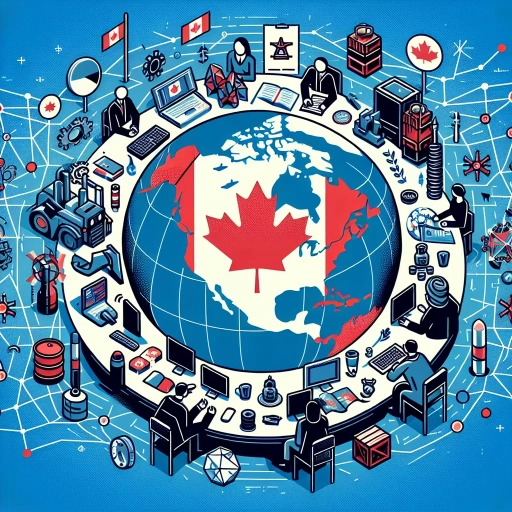How Geopolitics Caught Up With Canada

Understanding the Intricacies of Geopolitics
The Definition and Significance of Geopolitics
The term 'geopolitics' is a combination of 'geo' referring to Earth and 'politics', which refers to the activities associated with the governance of a country or area. Therefore, geopolitics essentially pertains to the influence of geographical characteristics and spatial relationships on political decisions. Understanding geopolitics is crucial in this day and age as it doesn't merely influence the domestic policies of a country, but also its international relations, economic activities, and socio-cultural dimensions. Canada, like many other countries, is not exempt from the impact of geopolitics, and over the years, various geopolitical trends have shaped the nation's politics, economics, and international relationships.
Factors Affecting Geopolitics
Geopolitics is a complex field influenced by a plethora of factors. Key elements include geographical location, allocation and accessibility of resources, demographic trends, technological advancements, and prevalent power structures. For instance, a country's geographical placement can determine its climate, available resources, and strategic importance in global politics. Similarly, demographic trends such as migration, population aging, and cultural diversity can have substantial geopolitical implications. Technological advancements, on the other hand, have the potential to redefine power dynamics and create new geopolitical realities, while existing power structures often dictate the rules of the geopolitical game.
The Interplay between Geography and Politics
The relationship between geography and politics is an ancient one, tracing back to the earliest human civilizations. Even in today's complex and interconnected world, geography continues to play a vital role in shaping political realities. For a country like Canada, its vast size, rich natural resources, diverse population, and strategic location have all contributed to its geopolitical standing. Whether it's negotiating international trade agreements, addressing indigenous rights, managing population growth, or tackling environmental challenges, Canada's geography heavily impacts these political processes. These factors together indicate that geographical characteristics are not merely physical entities but also crucial components of political strategy and decision-making.
How Geopolitics has Caught Up with Canada
Canada's Geopolitical Challenges
In recent years, the geopolitical landscape of Canada has undergone significant changes. The nation's close geographic and economic ties with the United States have led to the dominance of American influence, contributing to a range of geopolitical situations. Disputes over resources and territory, shifting alliances in the polar region, and grappling with refugee influx and immigration issues are some of its major challenges. Other issues include managing its vast landscape, maintaining ecological sustainability, and handling the implications of climate change. Understanding and addressing these geopolitical dynamics is crucial for Canada to ensure security, boost economic growth, preserve its national identity, and uphold its commitments to international agreements.
The Role of International Relations
International relations are integral in shaping Canada's geopolitical reality. Be it the nation's relationship with its southern neighbor, the United States, or its engagement with global powerhouses like China and Russia, diplomacy plays a pivotal role. Furthermore, Canada's active participation in international organizations such as NATO, WTO, and the United Nations is also an important feature of its geopolitical landscape. These relationships can create opportunities but also pose challenges. For instance, negotiations with the United States over trade agreements can have far-reaching economic implications, while tensions with Russia over Arctic sovereignty can significantly influence Canada's security and resource management strategies.
Geopolitics and Canada's Economy
Geopolitics has deep economic implications for Canada. The nation's economic prosperity depends significantly on its natural resources, such as oil, minerals, and timber, which are highly influenced by geopolitical factors. Trade relationships, global market dynamics, access to international waters, and territorial disputes can also shape the economic landscape. Additionally, innovations in technology and shifting demographics can influence employment trends, productivity, and social welfare policies. A clear understanding of these geopolitical dimensions can help Canada optimize its economic performance and navigate through potential challenges.
Strategies for Navigating Through Geopolitical Changes
Policy Revisions and Strategic Approach
In response to the evolving geopolitical scene, Canada needs a multi-pronged strategy. This involves revising current policies, enhancing diplomatic ties, and prioritizing sustainability. For instance, addressing climate change should be made a priority, not just in national politics, but also in international negotiations. Cross-border disputes over resources can be mitigated through diplomatic negotiations and multilateral agreements. Lastly, embracing technological advancements can provide solutions to geopolitical challenges and ensure economic competitiveness.
Strengthening International Alliances
A crucial part of Canada's geopolitical strategy involves strengthening alliances. This means working collaboratively with international allies, in order to ensure security, manage shared resources, and uphold global peace. It also entails maintaining a constructive relationship with the United States, given its proximity and economic influence, while being mindful of Canada's sovereign interests. Additionally, engaging with emerging powers like China and India, and maintaining a role in global organizations is vital to secure Canada's place in the international arena.
Investing in Sustainable Development
Given the growing global consciousness about sustainable development, Canada has the opportunity to leverage its rich natural resources while preserving the environment. This involves using technology to explore eco-friendly alternatives, investing in green energy, and implementing nature-based solutions to combat climate change. Furthermore, stewarding indigenous rights and land claims can also contribute to sustainable development, by conserving biodiversity and strengthening the cultural fabric of the nation. This integrated approach can help Canada navigate through geopolitical complexities while ensuring social, economic, and environmental sustainability.